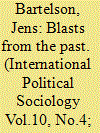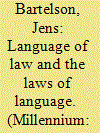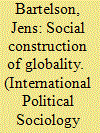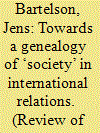| Srl | Item |
| 1 |
ID:
150567


|
|
|
|
|
| Summary/Abstract |
This article is a brief inquiry into the changing meaning of war in Western political thought, with special reference to its role in fracturing the contemporary international system. I argue that contemporary debates about the changing nature of war have failed to note what I take to be the most important change in our understanding of war in recent decades—the return of the long-suppressed view that regards war as a productive force in human affairs. I substantiate this argument by showing how war was long believed to be productive of sociopolitical order in general, and of the modern state and the international system in particular. I then proceed to show how similar conceptions of war inform contemporary practices of military intervention and nation-building, and how the acceptance of this view among scholars has made them complicit in its legitimization and reproduction.
|
|
|
|
|
|
|
|
|
|
|
|
|
|
|
|
| 2 |
ID:
050761


|
|
|
|
|
| Publication |
Cambridge, Cambridge University Press, 2001.
|
| Description |
x, 212p.
|
| Standard Number |
0521001404
|
|
|
|
|
|
|
|
|
|
|
|
Copies: C:1/I:0,R:0,Q:0
Circulation
| Accession# | Call# | Current Location | Status | Policy | Location |
| 047837 | 320.1/BAR 047837 | Main | On Shelf | General | |
|
|
|
|
| 3 |
ID:
144068


|
|
|
|
|
| Summary/Abstract |
The Status of Law in World Society by Friedrich Kratochwil is a sophisticated attempt to reassert the importance of international law in a globalised world by grounding it in the actual practices of legal reasoning. Yet this attempt to ground normativity in practice strikes me as problematic. As I shall argue, what law is cannot be determined with reference to legal practices only, but will depend on the fulfillment of certain background requirements which themselves stand in need of further justification. Thus the recourse to linguistic practice is beset by an ambivalence that stems from the fact that language and law always already are intertwined, an ambivalence that cannot therefore be overcome with recourse to either. If it is the case that law has a language of its own, we must also be prepared to admit that language has its own laws. What then is gained by the recourse to linguistic practice is not so much a resolution but rather a temporary displacement of indeterminacy from the realm of law to that of language.
|
|
|
|
|
|
|
|
|
|
|
|
|
|
|
|
| 4 |
ID:
073833


|
|
|
|
|
| Publication |
2006.
|
| Summary/Abstract |
This article purports to explain why the concept of global civil society recently has attracted so much interest within academic and political discourse. Given the ambiguity and apparent incoherence of this concept, its centrality within contemporary International Relations and political theory is puzzling. The article argues that once we pay attention to the function of the concept of domestic civil society within different historical contexts, we are better able to understand the logic governing the usage of global civil society as well. Much like its domestic antecedents, theories of global civil society provide answers to the question of how to govern effectively, in this case by constituting the global realm as a sphere of governmental activity, as well as by justifying the exercise of authority within this emergent sphere. The article concludes by discussing the ethical implications of the concept of global civil society, disputing its emancipatory potential.
|
|
|
|
|
|
|
|
|
|
|
|
|
|
|
|
| 5 |
ID:
169064


|
|
|
| 6 |
ID:
099455


|
|
|
|
|
| Publication |
2010.
|
| Summary/Abstract |
Today the concept of globality is widely used to describe a condition characterized by the presence a single sociopolitical space on a planetary scale. Yet international relations theory has been either unwilling or unable to understand the global realm in sui generis terms. This paper argues that if we want to make coherent sense of the global realm and its relationship to the international system, we must account for how globality has been constructed as a social fact. The paper then tries to provide some of the foundations of such an account by analyzing how a distinctively global space was forged out of changing cosmological beliefs about the makeup of the terrestrial surface during the Renaissance, and how these new beliefs in turned conditioned the possibility of modern practices of territorial demarcation and national identity construction. If valid, this interpretation implies that the order of analytical priority between the international system of states and the global realm ought to be reversed, and hence also that a sui generis account of globality must be built on the recognition that the world was global well before it became international in any recognizably modern sense of this latter term.
|
|
|
|
|
|
|
|
|
|
|
|
|
|
|
|
| 7 |
ID:
099496


|
|
|
|
|
| Publication |
2010.
|
| Summary/Abstract |
Today the concept of globality is widely used to describe a condition characterized by the presence a single sociopolitical space on a planetary scale. Yet international relations theory has been either unwilling or unable to understand the global realm in sui generis terms. This paper argues that if we want to make coherent sense of the global realm and its relationship to the international system, we must account for how globality has been constructed as a social fact. The paper then tries to provide some of the foundations of such an account by analyzing how a distinctively global space was forged out of changing cosmological beliefs about the makeup of the terrestrial surface during the Renaissance, and how these new beliefs in turned conditioned the possibility of modern practices of territorial demarcation and national identity construction. If valid, this interpretation implies that the order of analytical priority between the international system of states and the global realm ought to be reversed, and hence also that a sui generis account of globality must be built on the recognition that the world was global well before it became international in any recognizably modern sense of this latter term.
|
|
|
|
|
|
|
|
|
|
|
|
|
|
|
|
| 8 |
ID:
142538


|
|
|
|
|
| Summary/Abstract |
The concept of society and its cognates have long been widely invoked in order to understand International Relations. Theories of international society distinguish between a society of states and a mere system of states, and theories of world society assume that the world constitutes a single social space. In order to come to terms with the social character of International Relations, constructivists of different stripes have invoked a societal context within which the construction of identities and norms takes place. As I shall argue in this article, these usages draw on conceptions of society that emerged during the early phases of modern sociology, and have then been projected onto alien historical and cultural contexts. In order to avoid the anachronism and Eurocentrism that invariably have resulted from these uncritical usages, I argue that academic International Relations should seek to accommodate those forms of human association that cannot be subsumed under a recognisably modern concept of society by incorporating insights from postcolonial sociology into its theoretical core.
|
|
|
|
|
|
|
|
|
|
|
|
|
|
|
|